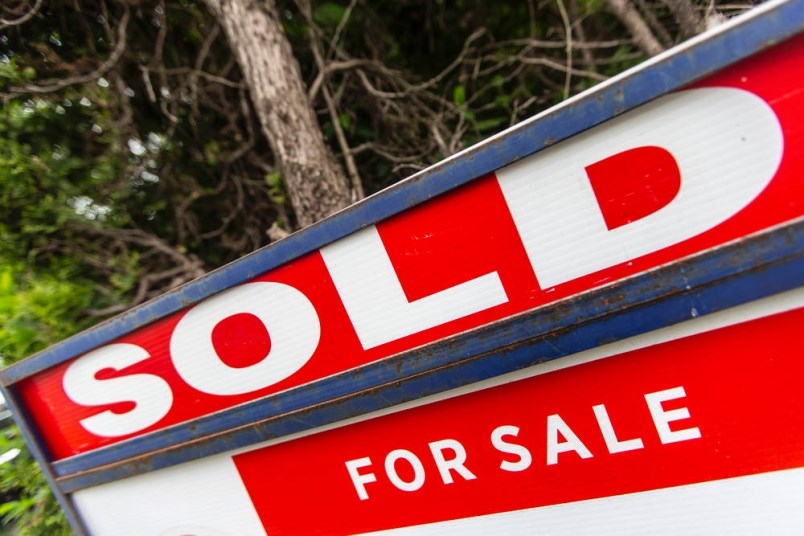Residential property sales are forecast to drop 17 per cent in 2022 after a year of record highs, said the B.C. Real Estate Association (BCREA) Wednesday — and that, projects the realtor advocacy group, will only lead to even higher housing prices.
Strong home sales are expected to continue over the first few months of 2022. But with limited supply, prices are expected to climb 8.5 per cent in 2022, with the steepest increases occurring over the first six months of the year, said the BCREA, which in addition to advocating for more than 24,000 realtors in the province, produces economic research.
"We expected home sales in 2022 to moderate from the frenetic pace of 2021," BCREA chief economist Brendon Ogmundson said in a prepared statement. "However, sales activity will remain high by historical standards."
By 2023, the supply of homes for sale is expected to increase once again as more units are built. That will slow the increase in residential property sale prices to an anticipated 2.7 per cent.
The province-wide housing forecast comes as the Real Estate Board of Greater Vancouver (REBGV) revealed that residential property sales had declined 4.4 per cent last in January compared to the same period in 2021.
Newly listed detached, attached and apartment properties declined 6.9 per cent last month compared to January 2021, dropping to 4,170 across Metro Vancouver.
"Our listing inventory on (Multiple Listing Service) is less than half of what would be optimal to begin the year. As a result, hopeful home buyers have limited choice in the market today," said REBGV economist Keith Stewart in a written statement.
"This trend is causing fierce competition for a scarce number of homes for sale, which, in turn, increases prices."
LOAD OF "DATA BS"
Claims suggesting the region's housing supply has kept up with demand has some experts scratching their head.
In a recent blog post this week, data analyst Jens Von Bergmann and University of British Columbia sociologist Nathanael Lauster challenged the idea that supply has kept up with demand in a city like Vancouver.
The claim, recently advanced by UBC urban design program founder Patrick Condon, suggests that between 2010 and 2016, 55,000 new units were built in the City of Vancouver and that over that same time frame, a roughly equivalent number of people were added to the population.
At two people per unit, that means supply has doubled demand, write Bergmann and Lauster.
Describing the idea that Vancouver's housing supply has kept up with demand as "a load of data bullshit," Bergmann and Lauster say the fudged numbers come from several sources: mixing two times frames, counting building starts before they are finished, overlooking demolitions and not considering declining household size, which requires adding more homes to keep up with the demands of current residents.
It wasn't always this way, says Bergmann. When asked on Twitter to compare the rate of new housing completions from the 1970s to the last decade, the data expert found a significant gap.
Compared to the 2010s, he wrote, the 1970s saw 66 per cent more housing completions per 1,000 people.
"In total numbers, we averaged 18,693 completions a year in the 2010s," wrote Bergmann, "had we been building at (the) same rate as in the 70s, it would have been 31,130.
"Over those 10 years, that's a difference of 125,000 units."
'MIDDLE-CLASS HOUSING OPTIONS' ON THE WAY
Last week, Mayor Vancouver Mayor Kennedy Stewart's won the backing of enough councillors to approve his "making home" housing initiative, which allows for up to six homes on a single-family lot. It had previously failed in 2020.
"There's nothing like this in Canada at the moment — I know there's a lot of eyes on this," said Stewart Jan. 26, suggesting full uptake of the program could lead to the construction of 10,000 homes.
Coun. Colleen Hardwick, one of two councillors who voted against many of the plan's 18 motions, questioned the mayor over what she described as an elaborate marketing campaign, including radio ads, to win a majority of the council's support.
Hardwick said rezoning the land will inflate land values, leading to an increase in speculation and the "demolition of existing affordable housing."
Stewart wants the plan geared to households who earn $80,000 or less per year and want to buy a home.
— With files from Mike Howell


.jpeg;w=120;h=80;mode=crop)
